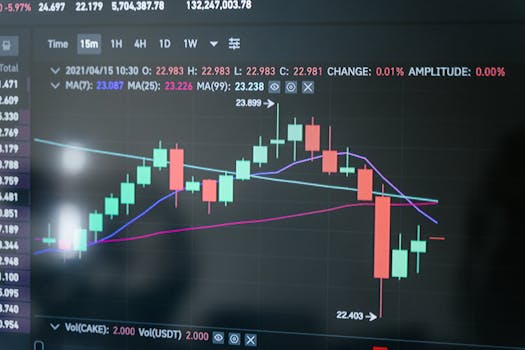

Cryptocurrency trading represents a transformative shift in the landscape of investing, offering unprecedented opportunities to participate in a decentralized, blockchain-driven market. As you delve into the world of digital assets like Bitcoin, Ethereum, and a myriad of altcoins, you are stepping into the forefront of financial technology. These digital currencies are not just shaping market trends; they are redefining the future of fintech. Engaging in crypto trading allows you to explore decentralized finance (DeFi), leveraging blockchain technology for secure, transparent transactions. With diverse trading strategies at your disposal, from analyzing market volatility to optimizing your crypto portfolio, embracing cryptocurrencies opens doors to innovative investing avenues and future investments, ensuring you stay ahead in this rapidly evolving financial ecosystem.

Cryptocurrency is a type of digital asset designed using blockchain technology to secure transactions. These digital currencies, such as Bitcoin and Ethereum, utilize cryptographic techniques to control their creation and verify the transfer of funds. Operating independently of any central bank, cryptocurrencies offer a new horizon of trading and investing, allowing you to be part of a decentralized financial system.
In the crypto market, you can trade a diverse array of altcoins, each with its unique tokenomics. For example, Ethereum not only serves as a digital currency but also supports smart contracts and decentralized apps (DApps). These features open up various trading strategies and investment opportunities, making it a versatile addition to your crypto portfolio.
Crypto exchanges facilitate the buying, selling, and trading of these digital assets. You can monitor market trends and conduct market analysis to make informed decisions. By understanding the intricacies of decentralized finance (DeFi), you can leverage blockchain's transparency and security features to enhance your trading experience and investment potential.
Market volatility is an inherent part of cryptocurrency trading. The rapid fluctuations can be driven by different factors such as regulatory news or technological advancements. Engaging in cryptocurrency trading means staying vigilant and adapting to these changes, ensuring your strategies align with the latest market conditions.
Initial coin offerings (ICOs) provide an additional avenue for investing in burgeoning blockchain projects. By participating in an ICO, you can be part of a project's early development stages, potentially reaping significant rewards if the project succeeds. This dynamic aspect of the crypto market offers you exciting opportunities to diversify and grow your investments.

The history of cryptocurrency began in 2009 with the advent of Bitcoin, created by an unknown individual or group under the pseudonym Satoshi Nakamoto. This groundbreaking digital asset introduced blockchain technology, providing a decentralized ledger to enhance security and transparency in transactions. The introduction of Bitcoin marked the beginning of a new era in trading and investing, reshaping the financial landscape with digital assets.
On one hand, proponents of cryptocurrency argue that it democratizes the financial market, offering decentralized finance (DeFi) solutions that bypass traditional banking systems. This perspective highlights the potential for greater financial inclusion and innovation through blockchain and fintech advancements. On the other hand, critics point to the market volatility and regulatory uncertainties as significant risks, viewing these factors as hindrances to widespread crypto adoption.
As the crypto market evolved, Ethereum's launch in 2015 further expanded the possibilities with its smart contracts and decentralized apps (DApps). Ethereum's contribution to tokenomics and ICOs has paved the way for a diverse array of altcoins, driving growth and diversification in the crypto portfolio of investors. The dynamic developments in blockchain technology continue to influence trading strategies and market analysis.
Crypto exchanges have emerged as essential platforms for trading a variety of digital currencies. These exchanges, by facilitating the exchange of Bitcoin, Ethereum, and other altcoins, play a pivotal role in shaping market trends and providing insights for future investments. The ongoing evolution of cryptocurrency underscores its transformative impact on global finance and the expanding opportunities within this vibrant ecosystem.

Cryptocurrencies come in many forms, each offering unique features and utilities. Bitcoin, the pioneer digital currency, remains the most recognized and widely traded. It set the standard for blockchain technology, providing a decentralized ledger that bolsters security and transparency. Bitcoin's prominence in the crypto market makes it a staple in any crypto portfolio, serving as a benchmark for other digital assets.
Ethereum distinguishes itself with the ability to create smart contracts and decentralized apps (DApps). What most people don’t see about Ethereum is the robust developer ecosystem behind it, driving continuous innovation in decentralized finance (DeFi) and tokenomics. This behind-the-scenes insight underscores Ethereum's versatility, influencing various trading strategies and market trends within the ecosystem.
Altcoins, like Litecoin, Ripple, and Cardano, offer alternative investment opportunities with different technological benefits and use cases. Some focus on faster transaction speeds, while others emphasize low transaction costs or enhanced privacy. The diversity in altcoins allows you to diversify your investments, mitigating risk through a well-rounded crypto portfolio.
Non-fungible tokens (NFTs) represent another exciting evolution within cryptocurrencies, enabling unique digital assets. These NFTs provide new dimensions for investing, particularly in digital art and collectibles. The increasing adoption of NFTs highlights the expanding horizons of cryptocurrency, driven by ongoing advancements in financial technology and blockchain applications.

Cryptocurrency trading involves buying, selling, and exchanging digital assets through crypto exchanges. In the words of renowned investor Paul Tudor Jones, “Bitcoin has a lot of characteristics of being an early investor in a tech company.” This highlights how understanding blockchain and market trends can help you make informed investing decisions. You trade cryptocurrencies like Bitcoin and Ethereum by speculating on their price movements, influenced by market volatility and technological advancements.
Navigating crypto exchanges is crucial for successful trading. These platforms, such as Binance or Coinbase, facilitate transactions by connecting buyers and sellers. By leveraging decentralized finance (DeFi) and smart contracts, these exchanges ensure secure, transparent operations, empowering you to manage your crypto portfolio effectively. Analyzing tokenomics and applying diverse trading strategies can enhance your market analysis, driving better investment outcomes.
Understanding market volatility is essential to cryptocurrency trading. The rapid price changes offer opportunities and risks, demanding vigilance and strategic adjustments. Monitoring regulatory updates and technological innovations can inform your trading choices. Investing in altcoins and participating in ICOs further diversifies your holdings, aligning with evolving market trends. With each trade, you contribute to the dynamic growth and adoption of digital currencies, encompassing a broad spectrum of financial technology advancements.

Key cryptocurrency exchanges play a significant role in the trading ecosystem, offering platforms where you can buy, sell, and trade digital assets. Exchanges like Binance and Coinbase are among the most popular, providing a user-friendly interface and a wide array of cryptocurrencies, from Bitcoin and Ethereum to various altcoins. These exchanges support diverse trading strategies, helping you manage your crypto portfolio effectively.
While many believe that decentralized finance (DeFi) is the future of trading, there’s a strong case for centralized exchanges due to their robust security measures and regulatory compliance. These platforms offer comprehensive market analysis tools and facilitate easier entry for new investors. Centralized exchanges often have higher liquidity, allowing for quicker transactions, which may be advantageous during high market volatility.
Crypto exchanges also feature initial coin offerings (ICOs) and token launches, providing opportunities for early investments in new blockchain projects. Participating in these offerings allows you to diversify your crypto holdings and gain exposure to innovative financial technologies. Monitoring market trends and updates from these exchanges can inform your trading decisions, aligning your investments with evolving market dynamics.
Regulatory compliance is another crucial factor influencing the operation of key cryptocurrency exchanges. Adhering to crypto regulations helps build trust and ensures a safer trading environment. Understanding these regulations can provide you with insights into market trends and potential future investments, enabling you to navigate the complexities of the crypto market more effectively.

Creating a cryptocurrency wallet is a fundamental step in trading and investing in digital assets. A wallet allows you to store, send, and receive cryptocurrencies like Bitcoin and Ethereum securely. There are various types of wallets available, including hardware wallets, software wallets, and web wallets. Each type offers different levels of security and convenience, enabling you to choose one that suits your trading strategies and needs.
To create a cryptocurrency wallet, you will typically need to set up an account with a wallet provider. For example, platforms like MetaMask offer wallets specifically designed for Ethereum and its decentralized apps (DApps). This wallet integrates with many DeFi platforms, allowing you to participate in decentralized finance activities seamlessly. It’s crucial to understand the tokenomics and security features of the wallet you choose to ensure your digital assets are well-protected.
In the next few years, advancements in financial technology are likely to make cryptocurrency wallets even more user-friendly and secure. Innovations like biometric authentication and advanced encryption methods are anticipated to enhance wallet security. These improvements will make it easier for you to manage your crypto portfolio, execute trading strategies, and stay ahead in the rapidly evolving crypto market.
Market trends indicate a growing adoption of digital currencies and non-fungible tokens (NFTs), emphasizing the need for versatile and secure wallets. As the crypto market continues to expand, having a reliable wallet will be imperative for efficiently navigating crypto exchanges, participating in initial coin offerings (ICOs), and capitalizing on future investments. Understanding the nuances of creating and managing a cryptocurrency wallet will empower you to make informed investing decisions and optimize your trading outcomes.
Get free resources, tips & tricks, exclusive news, and special offers by joining the Cryptonite Newsletter.